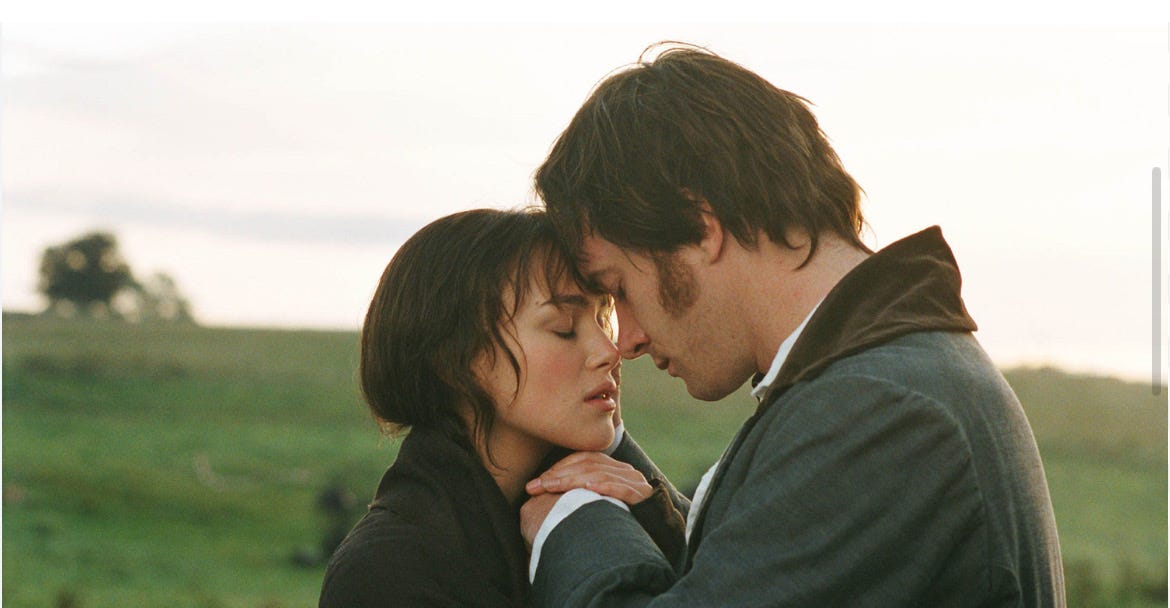I’ve spent an unusual amount of time lately wondering whether or not my standards are too high.
I listen to stories of couples who got together through cheating, manipulation, or wearing the man down until he finally proposed—and I do not desire that. I don’t desire that one bit.
Yet, these stories are so common to the point that I wonder if I’m the weird one. I had the thought recently:
“Does wanting a relationship where it is consistently clear that he values me, respects me, and wants me to be emotionally safe make me the odd one out?”
I now know that is not the case, but I’d like to illustrate to you, reader, how I got there.
It started with Elizabeth Bennet from Pride and Prejudice. The reason she was “odd” was because she wanted to be with someone who genuinely liked her. Let that settle in. Granted, it was a different time. However, I see women today whose qualifications for their male partners are similar to “Isn’t abusive and doesn’t hate my presence," and I see it often. It’s like we’ve gone back in time.
I’ll begin by affirming to you that people are allowed to have different standards for relationships, as well as their desired lifestyles at large. It’s okay if you need to be with someone who loves cats. I don’t need that, but that’s great for you! Our standards can be different. There are basic principles, though, like having bodily autonomy and genuine joy, that I find to be pretty universal. Yet, people will try and convince you that even those standards are impossible to meet. The dissenters get even louder when you are someone who has unique needs or desires. I’m here to tell you that you aren’t wrong for wanting more out of life.
The biggest sign that your standards aren’t too high is that you are not an ordinary person. Since you are not an ordinary person, you will not have an ordinary life. For example, I am a soft-hearted person. That means I need to surround myself with extremely empathetic, honest individuals. I can also be extremely headstrong and need at least a few people who are willing to match my argumentative attitude at times. Iron sharpens iron.
Whether you are neurodivergent, sensitive, driven, unique, or otherwise set apart, you will thrive best in environments that foster a healthy ecosystem for someone like you. That’s not a bad thing—It’s essential. The fact that you want something more—something special—is proof that it exists.
Now, we need to talk about the push-back you’re going to get for having high standards, whether that’s for your romantic relationship or life overall.
People will say your standards are “too high” for a few reasons
They do not meet your standards
I’m actually not going to put this lightly, but it needs to be put somewhere—somehow. So, as much as I want to sugarcoat it, I don’t think it benefits you to do so. Here’s the truth: You will become the enemy to people who cannot meet your standards, and you have to be okay with that. When I say “enemy,” I’m not referring to a flaming villain with a pitchfork and a chalkboard in their basement dedicated to ruining your life. I’m not even saying that they are your enemy. However, I am saying that they may not necessarily have your best interest at heart when it comes to advice they give on your life pursuits. Many people, in situations where they feel inadequate, tend to minimize the qualifications they can’t meet or even the person communicating those qualifications. I see it in conversations about dating, friendship, career choices, and other facets of life. I’m not saying that any dissenters to ways in which you live your life are haters. That would be oversimplistic. What I am saying, though, is that all advice isn’t necessarily good advice.
They are afraid to have the same standards
This is the part I hate to admit, as I was taught through rom-coms, coming of age indie films, and thrilling action sequences the contrary—but, most people are cowards.
And there isn’t much wrong with being a coward. Cowardice is comfortable. It keeps you in a relationship that drains you, at a job you hate, in a neighborhood that makes you feel trapped, and in the same mental loop convincing yourself that you have run out of choices. (To be clear, privilege still exists and some of us are more socially, physically, or economically vulnerable than others. I am also not referring to people in unsafe or abusive situations.) I don’t mean to imply that people who don’t pursue their passions are cowards. Perhaps, they choose a different path out of necessity or change of values. It would be foolish to discount that. As I’ve said in previous newsletters, fear can be used as a protective measure. Fear isn’t always bad. The tragedy isn't cowardice—The tragedy is pretending that you are happy when you are not. Most people will live their entire lives doing what they think they’re supposed to do. Those people will be just fine. If you are a deeply passionate, extremely observant, or constantly inspired individual, though, you more than likely will not be satisfied with that kind of life. The people who are afraid of breaking cycles, digging their heels into the ground, or doing something different will try to convince you that they like their lives. But you know better.
Little do they know that you see their eyes light up when they’re working on their “little projects,” when their current partner isn’t in the room, or when they travel to a different city. They become a different person when they are walking in their purpose, and are afraid to admit it. To admit it would be to come face to face with their own lack of courage, and that would be unbearable.
You, however, are brave. And you might just need to be the blueprint.
-CM





“ You will become the enemy to people who cannot meet your standards, and you have to be okay with that.” Yes. This is true. So much good stuff in this post, Chamaya! Also “Jane Austen in Vermont” made me crack up.